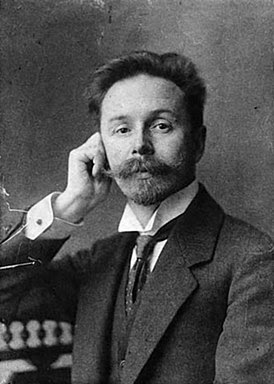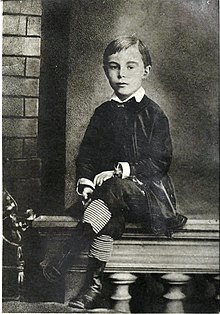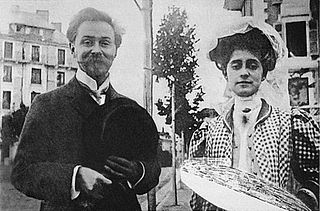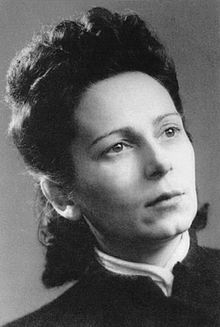| Edit | Map | Home | New Post | New Gallery |
Support
|
 | |
Alexander Nikolaevich Skryabin ( December 25, 1871 ( January 6, 1872 ), Moscow , Russian Empire - April 14 (27), 1915 , ibid) - Russian composer and pianist , teacher , representative of symbolism in music. He was the first to use color in the performance of music, thereby introducing the concept of " light music ". Biography
Scriabin was born into the family of a student at Moscow University , who later became a prominent diplomat, a real state councilor, Nikolai Alexandrovich Skryabin (1849-1915) in the house of the Kiryakovs' city estate . He was baptized in the Church of the Three Hierarchs in Kulishki . In the Central State Historical Archive of the city of Moscow, “the parish book given from the Moscow Spiritual Consistory of Ivanovsky Soroka to the Three Saints Church on Kulishki” is stored, in which the birth of the future composer was recorded. The noble family of the Scriabins was not ancient and rich. The composer's great-grandfather - Ivan Alekseevich Skryabin (born in 1775) - came "from the soldiers' children of the city of Tula "; for bravery in the battle near Friedland he was awarded the insignia of the military order of St. George and a cross for the lower ranks; having received the rank of second lieutenant in 1809 , ten years later, together with his son Alexander, he is included in the genealogical book of the nobles of the St. Petersburg province ; the composer's grandfather - Alexander Ivanovich - according to the rank of lieutenant colonel, was entered in 1858 in the second part of the genealogical book of the nobility of the Moscow province. The composer's mother Lyubov Petrovna (nee Shchetinina) (1848-1873) was a talented pianist who graduated with honors from the St. Petersburg Conservatory in the class of Theodor Leshetitsky.
Lyubov Petrovna, at the age of 25, suddenly died of consumption a year after the birth of her son, while being treated in Tyrol . In 1913, Scriabin, being with his father in Lausanne , visited with him the grave of his mother. A photograph of the grave is kept in his archive. Upon graduation, in the spring of 1878, Nikolai Alexandrovich was appointed to serve in the Ministry of Foreign Affairs and at the end of that year was already assigned to the embassy in Constantinople . Little Shurinka remained in the care and upbringing of his grandmother, his father's mother, Elizaveta Ivanovna (nee Podchertkova, who had an estate in the Borovichi district of the Novgorod province ) , her sister Maria Ivanovna Podchertkova, who became his godmother, and his grandfather, Lieutenant Colonel of Artillery Alexander Ivanovich Skryabin (1811-1879) . The father's sister, Lyubov Alexandrovna, also devoted herself to raising the boy, leaving memories of her nephew's childhood full of enthusiastic love. His own uncles (all military) also took part in the upbringing of the young composer. After the early, untimely death of his wife, Nikolai Aleksandrovich was married for the second time to an Italian citizen, Olga Ilyinichna Fernandez. They had five children: Nikolai, Vladimir, Xenia, Andrey, Kirill.
Already at the age of five, Scriabin knew how to play the piano , later he showed interest in composition, however, according to family tradition (the Scriabin family gained fame from the beginning of the 19th century and consisted of a large number of military ) was sent to the 2nd Moscow Cadet Corps , from which he graduated in 1889. Deciding to devote himself to music, Scriabin began taking private lessons from Georgy Eduardovich Konyus , then from Nikolai Sergeevich Zverev (piano; at the same time as the young S.V. Rachmaninov ) and Sergei Ivanovich Taneyev (music theory). Studying in the last year of the cadet corps, Scriabin entered the Moscow Conservatory in the piano classes of Vasily Ilyich Safonov and the composition of Anton Stepanovich Arensky . Classes with Arensky did not bring results, and in 1891 Scriabin was expelled from the composition class for poor progress, nevertheless, he brilliantly completed the piano course a year later with a small gold medal ( Sergei Vasilyevich Rachmaninov , who graduated from the conservatory in the same year, received a large medal, as he also passed the course of composition with honors). After graduating from the conservatory, Scriabin wanted a career as a concert pianist for himself, but in 1891 he outplayed his right hand and for some time could not perform. In August 1897, in the Varvara Church in Nizhny Novgorod, Scriabin married a young talented pianist Vera Ivanovna Isakovich. Having restored the working capacity of his hand, Scriabin and his wife went abroad, where he earned a living by performing his own compositions. The Scriabins returned to Russia in 1898, in July of the same year their first daughter, Rimma, was born (she would die at the age of seven). In 1900, a daughter, Elena, was born, who would later become the wife of the outstanding Soviet pianist Vladimir Vladimirovich Sofronitsky . Later, a daughter Maria (1901) and a son Leo (1902) appeared in the family of Alexander Nikolayevich and Vera Ivanovna. In September 1898, Scriabin was invited to the post of professor at the Moscow Conservatory , and in 1901-1902 he also taught at the Women's Catherine's Institute . However, in 1903 he left teaching, as it greatly distracted him from his own work. In 1906-1907. performed in the USA with concerts organized by V. I. Safonov , which made a great impression on the American musical community. At the end of 1902, Scriabin met his second wife (they were not officially painted) Tatyana Fedorovna Schlozer , niece of Paul de Schlozer , a professor at the Moscow Conservatory (whose class the composer's official wife also studied). Until 1910, Scriabin again spent more time abroad (mainly in France , later in Brussels , where he lived at 45 rue de la Réforme ), performing as a pianist. Returning to Moscow, the composer continues his concert activity, without ceasing to compose. Scriabin's last concert took place on April 2/15, 1915 in the Small Hall of the Petrograd Conservatory. Scriabin died of sepsis resulting from a carbuncle on his upper lip. He was buried on April 29 with a large gathering of people at the Novodevichy Cemetery in Moscow. At his funeral, his teacher S. I. Taneyev caught a cold and soon died . In recent years, he lived with his civilian family in Moscow at Bolshoy Nikolopeskovsky lane , 11. In this house on October 10, 1918, a memorial museum was established on the initiative of Tatyana Fedorovna Shlozer; with the help of Alexander Goldenweiser and Anatoly Lunacharsky, she managed to obtain a safe-conduct, which forbade the local authorities to make a communal apartment out of his dwelling. In 1922, the Scriabin Museum was officially opened to visitors and to this day operates as the Memorial Museum of A. N. Scriabin . Maria Veniaminovna Yudina recalled the return to Moscow on March 9, 1942 of Sofronitsky , who was rescued from besieged Leningrad :
FamilyAlexander Nikolaevich had seven children in total: four from his first marriage (Rimma, Elena, Maria and Lev) and three from his second ( Ariadna , Julian and Marina ). Of these, three died in childhood, far from reaching adulthood. In the first marriage (with the famous pianist Vera Isakovich ), out of four children (three daughters and one son), two died at an early age. The first (being seven years old) died the eldest daughter of the Scriabins - Rimma (1898-1905) - this happened in Switzerland , in the holiday village of Vezna near Geneva , where Vera Scriabin lived with her children. Rimma diedJuly 15 , 1905 in the cantonal hospital for intestinal volvulus. By that time, Scriabin himself lived in the Italian town of Bogliasco - already with Tatyana Shlozer , his future second wife. “Rimma was Scriabin's favorite and her death deeply shocked him. He came to the funeral and sobbed bitterly over her grave. <...> This was the last meeting of Alexander Nikolaevich with Vera Ivanovna ” . Scriabin's eldest son, Lev, was the last child from his first marriage, he was born in Moscow on August 18/31, 1902. Just like Rimma Scriabina, he died at the age of seven (March 16, 1910) and was buried in Moscow at the cemetery of the Joy of All Who Sorrow Monastery (Sorrowful Monastery) on Novoslobodskaya Street (currently the monastery does not exist). Of the two (long-awaited) sons of Alexander Nikolaevich Scriabin, only one remained alive at that time, Julian. Ariadna Scriabina married the poet Dovid Knut in her third marriage , after which she converted to Judaism . Together with her husband, she participated in the resistance movement in France , was hunted down in a safe house by the Vichy police in Toulouse during a mission to transport refugees to Switzerland , and on July 22, 1944, she died in a shootout while trying to detain . In Toulouse, a monument was erected to her , and on the house where A. Scriabina died, members of the Zionist Youth Movement of Toulouse erected a memorial plaque with the inscription:"In memory of Regina - Ariadna Fixman, who heroically fell at the hands of the enemy on July 22, 1944, defending the Jewish people and our homeland, the Land of Israel " . The composer's son Yulian Scriabin , who died at the age of 11, was himself a composer, whose works are performed to this day. The half-sister of Alexander Nikolaevich Ksenia Nikolaevna was married to Boris Eduardovich Bloom. Court adviser B. E. Bloom then served in a mission in Bukhara, and in 1914 he was listed as vice consul in Colombo on the island of Ceylon, where he was “seconded to strengthen the personnel of the political agency,” although he did not travel to the island. On June 19, 1914, their son Andrei Borisovich Bloom was born in Lausanne, who, under the monastic name Anthony ( 1914 - 2003 ), would later become a famous preacher and missionary. The great-nephew of the composer, Alexander Serafimovich Skryabin, in 1992 created the A.N. Scriabin to talk about the work of the great ancestor. CreativityScriabin's work stands on the border between the late Romantic tradition, in line with which his contemporaries admired him, and the search for the musical avant-garde, who later identified Scriabin as one of their heralds. According to the composer Sergei Nevsky , "Scriabin's music was truly heard and analytically appreciated by European composers only in the mid-70s of the XX century", when they learned "to see in it not only and not so much an affect as order, paradoxical logic and mathematical proportion of parts and the whole”. Nervousness, impulsiveness, anxious searches, not alien to mysticism , are clearly felt in Scriabin's music. From the point of view of composing technique, Scriabin's music is close to the work of composers of the New Vienna School ( Schoenberg , Berg and Webern ), but it is solved from a different perspective - through the complication of harmonic means within the limits of tonality . At the same time, the form in his music is almost always clear and complete. The composer was attracted by images associated with fire : fire, flame, light, etc. are often mentioned in the titles of his works. This is due to his search for the possibilities of combining sound and light. In his early compositions, Scriabin, a subtle and sensitive pianist, consciously followed Chopin , and even created works in the same genres as him: etudes , waltzes , mazurkas , sonatas , nocturnes , impromptu , polonaise , concerto for piano and orchestra , although already in that period of his creative formation, the composer's own style was manifested. However, subsequently Scriabin turned to the genre of the poem , both piano and orchestral. His major works for orchestra are three symphonies ( the First was written in 1900, the Second in 1902,Third - in 1904), Poem of Ecstasy (1907), " Prometheus " (1910). In the score of the symphonic poem "Prometheus", Scriabin included the part of the light keyboard, thus becoming the first composer in history to use color music . One of the last, unfulfilled plans of Scriabin was "Mystery", which was to be embodied in a grandiose performance - a symphony of not only sounds, but also colors, smells, movements, even sounding architecture. At the end of the 20th century, composer Alexander Nemtin, based on sketches and poems by Scriabin, created a complete musical version of its initial part - "Preliminary Action", however, excluding the main part of the text from it.
Scriabin considered his own creativity not as a goal and result, but as a means to achieve a much larger universal task. Through his main work, which was to be called "Mystery", he intended to complete the current cycle of the existence of the world, to unite the World Spirit with inert Matter in some kind of cosmic erotic act and thus destroy the current Universe, clearing the place for the creation of the next world. Purely musical innovation, which manifested itself especially boldly and vividly after the Swiss and Italian period of Scriabin's life ( 1903-1909 ) .) - he always considered secondary, derivative and designed to serve the fulfillment of the main goal. Strictly speaking, the main and brightest works of Scriabin - "The Poem of Ecstasy" and "Prometheus" - are nothing more than a preface ("Preliminary Action") or a description by means of musical language, exactly how everything will happen during the fulfillment of the Mystery and the union of the world Spirit with Matter. |
Author: Sonya Version: 1 Language: English Views: 0
|
Short link: https://www.sponsorschoose.org/a239
Short link to this version: https://www.sponsorschoose.org/n267
Created by Sonya at 2023-07-03 08:20:37
Last modified by Sonya at 2023-07-03 08:34:52
|







